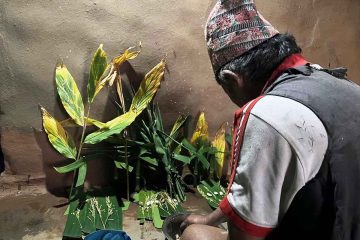
The Vibrant Tapestry of Tradition: A Glimpse into Limbu Wedding Ceremonies in Nepal
The Limbu Wedding Ceremony in Nepal is more than just a celebration — it is
a captivating display of the vibrant cultural tapestry woven by the Limbu
community, encompassing a plethora of age-old traditions and customs that have
been lovingly preserved and passed down through generations. Central to Limbu
marriages is the principle of endogamy, a practice deeply ingrained in their
culture, where individuals primarily seek life partners from within their own
close-knit community. This emphasis on marrying within the community enforces a
sense of unity and solidarity among Limbu people, with one notable restriction
being the avoidance of cross-cousin marriages, further underscoring the
importance placed on preserving the community’s unique lineage and traditions.
However, within the overarching framework of these customs lies a
fascinating complexity that highlights the nuanced flexibility within Limbu
traditions. For instance, a notable exception to the endogamy rule is the
acceptance of a man marrying the widow of his elder brother, provided both
parties willingly consent, illustrating the intricate blend of tradition and
adaptability present in Limbu culture. Additionally, despite the preference for
endogamous unions, marriages outside the clan are not uncommon, either arranged
by families or initiated through mutual agreement between the prospective
partners, showcasing the dynamic evolution and fluidity inherent in Limbu
marital customs.
Delving deeper into the historical roots of Limbu wedding customs leads us back
to the esteemed Thibong Yakthungs, an ancient council comprised of Ten
Chieftains of Limbuwan who laid down the foundations of the timeless practices
that continue to shape Limbu matrimonial traditions to this day. The
involvement of parents in the marriage process is a customary facet, reflecting
the respect for familial ties and the shared journey of the couple. While
parental oversight is prevalent, there are instances where love triumphs as
couples elope to unite in matrimony, adding a touch of spontaneity and romance
to the otherwise meticulously orchestrated ceremonies.
One pivotal ritual that underscores the significance of a union is the
ceremonial gesture of asking for the woman’s hand, symbolizing not only respect
for tradition but also the groom’s commitment to providing for his bride. This
ritual often involves the exchange of symbolic gifts such as gold, silver, and
other valuable tokens, signifying the groom’s dedication to the well-being and
happiness of his future spouse, ensuring her family’s peace of mind.
As the wedding festivities unfold, a cherished tradition unfolds as the
groom’s family embarks on a visit to the bride’s home, bearing offerings that
symbolize not just material wealth but also the groom’s ability to support his
new family. The choice of gifts, ranging from piglets to various beverages,
reflects the economic status of the groom’s family and serves as a tangible
demonstration of their willingness to nurture and provide for the newlywed
couple in their shared life journey.
While the wedding celebrations are predominantly held at the groom’s
residence due to the bride relocating to her husband’s home, both partners
partake in special dances called “Yalakma” and “Kelangma,”
enhancing the jubilant festivities with their captivating grace and rhythmic
movements. The Yalakma dance, characterized by its enchanting circular motion,
embodies the beauty and harmony of marital union, while the Kelangma dance
showcases intricate footwork synchronized with the melodious beats of traditional
drums, infusing the celebration with a palpable sense of joy and exhilaration.
These dances, open to all who wish to participate, serve as a testament to
the enduring love and cultural heritage cherished by the Limbu community,
magnificently brought to life through soul-stirring performances. Whether
performed during bountiful harvest seasons or spirited communal gatherings, the
Yalakma and Kelangma dances serve as poignant reminders of the deep-rooted
traditions and unbreakable bonds that form the heart and soul of Limbu wedding
ceremonies, transcending time and space to celebrate love, unity, and the
enduring legacy of a vibrant culture.



